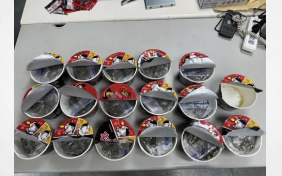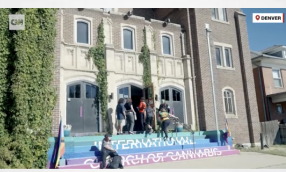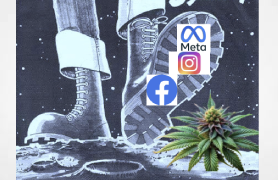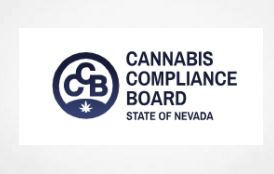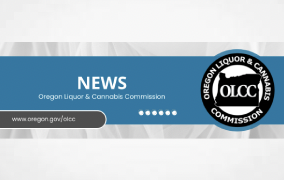AUTHOR: HEATHER ALLMAN
ON THE BURNER— Interview with Arman Zeytounyan, CEO and Co-Founder of EcoWaste in California
The “Beast” in this scenario is cannabis sustainability, and the distinct lack thereof. The market for change is wide open, and here’s the perspective of one man and the vision of one California company who is getting an edge in the sustainability market due to the cannabis waste removal and compliance services they offer.
COMPANY HIGHLIGHTS:
EcoWaste ensures compliance every step of the way for the security of your cannabis license. EcoWaste provides an exceptional, reliable and proven cannabis waste disposal.
EcoWaste believes there’s a better way to conduct cannabis waste management, combining the right knowledge and provide a solution that is effective and embraces the regulations.
EcoWaste was founded by Avo Gasparian and Arman Zeytounyan in 2016. It started as a organic, or green, waste disposal service for the food and construction industry. During these early stages EcoWaste began testing our process and setting up a durable infrastructure.
— — — — —
CANNABIS LAW REPORT: Why did you get into this particular business?
ARMAN ZEYTOUNYAN: “Before starting EcoWaste, I was already a part of a specialized waste company. My business partner started BioWaste in 2011, which performs solely medical/biohazard waste management disposal service.
In early 2018, we began to receive inquiries for cannabis waste. At that point, we reached out to some friends in the industry to learn more. After doing some research on the cannabis compliance regulations, we concluded that cannabis waste is a service that we are perfectly suited to manage for the industry.”
— — — — —
CLR: Is EcoWaste and recycling a component that is required in the California cannabis regulatory framework?
AZ: “The cannabis regulations in California don’t require a cannabis business to use our service or to recycle the waste they generate. They do, however, require that the waste is handled in a way that decreases the possibility of under the table actions.”
— — — — —
CLR: Do you think it should be a required component of any states medical cannabis regulatory framework?
AZ: “Absolutely. Biases aside, the biggest value a company like ours provides is compliance. Having a third party correctly dispose of cannabis waste greatly decreases the opportunity involved in illicit activities. Recycling itself is a good habit for anyone to get into of course. That being said, cannabis is a green waste and there’s a lot of potential for re-purposing the material. The challenge is the volume needed to see real results isn’t there yet since California is still majorly a black market.“
Surely, part of the issue with it being labeled “green waste” is that licensees don’t yet know how to execute proper recycling or consumer renewability of a Schedule I-tainted product.
— — — — —
CLR: What one thing you do in your line of work that you feel is the very most important, that makes the most impact? Why?
AZ: “Easily it’s the compliance service we provide. When you’re a part of an industry that’s so new, it’s important to focus on the long term.”
“Just because something isn’t being enforced or otherwise emphasized today doesn’t mean the hammer won’t fall tomorrow.”
AZ: “Many people overlook the value waste management has to offer, but that’s not the wisest approach. Our compliance value comes in when a cannabis business owner’s integrity is questioned. Are they doing anything illegal with their products? Well, by taking advantage of our compliance service owners are able to confidently prove they are not engaging in anything illicit.”
— — — — —
CLR: I know you are currently only in California; however, what are your plans for the future of cannabis recycling & sustainability? Or what would you like the future of cannabis sustainability to look like?
AZ: “Geographical expansion is something we are certainly working towards. But as of now, we’re really excited about working with other sustainability-focused brands to co-create products that are biodegradable and can be put back into the supply chain, although it’s not as simple as many would think.”
— — — — —
CLR: Give me examples of one easy renewability solution for (a) companies? one easy renewability solution for (b) dispensaries?
AZ: “Currently it doesn’t exist. Our waste exports have been put on hold and recycling companies are not doing well right now. A dispensary will typically generate plastics and glass, but most recycling companies that have the infrastructure to do something with them won’t accept it because it’s cannabis waste. Small “mom and pop” operations might be interested in the plastics but recycling glass from the cannabis industry is extremely challenging.”
— — — — —
CLR: Is there one easy renewability solution for (c) end user consumers?
AZ: “The most practical approach a consumer of cannabis can participate in is by returning their packaging to the dispensaries and letting the dispensaries include that with their waste programs. Most of the licensees that we work with are in the process of forming a workable solution for the end user aspect that fits within the state compliance guidelines.”
— — — — —
CLR: What do you see for the future of cannabis sustainability and cannabis nationwide?
AZ: “I have hopes for cannabis sustainability. It may be very biased of me but there’s certainly potential for the cannabis industry to play a big role in biodegradable products. Naturally, hemp will be a big piece of that but cannabis waste consumers typically favor sustainability which ultimately means companies will have to find solutions that appeal to that.”
“70% of our licensees inquire about cannabis waste sustainability and cannabis waste recycling.”
— — — — —
CLR: What one piece advise have you along the way that you wish you someone had told you when you first started out?
AZ: “Hm, picking one piece is the hard part! But I would say be fast but patient. If something isn’t working out, scrap it, re-adjust, re-apply and repeat. At the same time being patient while you continue that process, but I mean real patience. We’re talking about years of patience not months.“
— — — — —
CLR: Your view of current cannabis sustainability (or lack thereof) in 10 words or less?
AZ: “Not enough volume yet to yield real long term results. – Got 10 exactly : )”
— — — — —
CLR: What advice can you offer to those individuals interested in starting a business similar to yours in any state?
AZ: “Be prepared to get your hands dirty. Anybody that thinks their above doing “their level’ in waste management is set to fail. Trucks break down, clients get confused, rain causes delays, employees get sick, and so on. As a logistics company you have to do whatever needs to be done to provide the client exceptional service.”
— — — — —
CLR: If in a vertically integrated program are you for or against state government compliant of renewability and cannabis waste?
AZ: “Against. I believe cannabis companies should be required to follow certain procedures to maintain safe practices and responsible procedures however requiring recycling would be disastrous for business owners. Sustainability does not have stability. Waste is a very broad category and there are thousands of ways to be sustainable. But so far there isn’t a one size fits all.
There are different approaches for different situations, waste sub types, geographical areas, and so on. Thus, requiring companies to recycle will only put business owners in a position to not be in compliance. Sustainability is about education, testing, and patience.“
“Although we can offer limited solutions at a corporate level, many dispensary licensees haven’t yet figured out how to properly execute a compliant and successful end-user recycling program.”
— — — — —
CLR: What advice can you offer to the states as a whole concerning cannabis sustainability and the importance of utilizing it to the fullest extent, even to the point of state-governed compliance?
AZ: “Education. People need to understand how the waste world really works. It’s really confusing and contradicting. There are so many different waste processes and they each yield different results. I think it is vitally important that we continue doing research and testing and finding ways to make it interesting for consumers to pay attention to.”
“We do have several licensees telling us they get more and more patient requests for on-site recycling options and availability; that’s a great thing.”
AZ: “We are also looking into the possibility of offering group education so that our existing licensed clients, the state’s cannabis employers, can learn more about cannabis waste renewability options and state-compliant rendering.”
— — — — —
Use this checklist to ensure any cannabis business remains compliant with the State of California.
California Cannabis Waste Compliance rules via EcoWaste:
- Do not sell, transfer, donate, or give away any cannabis waste.
- Dispose cannabis waste only in a secured waste receptacle specifically designated for cannabis waste.
- Keep cannabis waste in secured designated waste location on licensed premises until it can be collected.
- Make cannabis goods into cannabis waste by rendering the goods unusable and unrecognizable at minimum by removing any packaging.
- Record date and time the cannabis goods were rendered into cannabis waste.
- After collection obtain a manifest from hauler that indicates the date and time of each collection and confirmation of disposal at the solid waste or composting facility.
- Maintain records all activity related to the generation and disposal of the cannabis waste.
- These regulations are subject to change at any time per the State of California Code of Regulations and the Bureau of Cannabis Control.
- *Note if you are using our cannabis waste disposal services we provide the following for your business and records secured waste receptacles, date, time, and weight of cannabis waste when collected (via manifest), date, time, and weight when cannabis waste is either disposed of at a solid waste or composting facility (via manifest).


